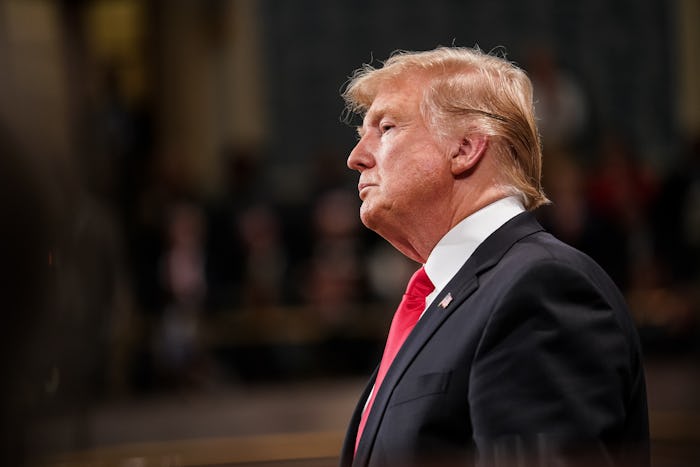News

Lawmakers May Have Reached An Agreement To Avoid Another Government Shutdown
With the deadline for bipartisan agreement on President Donald Trump's border wall funding demands approaching, people across the country are likely wondering if the government will shut down again. As of now, reports indicate that lawmakers reached an agreement that would prevent another shutdown at the end of the week. Many of the details of the agreement, however, have been kept intentionally under wraps, but some has been shared about the talks.
Late Monday evening, lawmakers announced they had arrived at a tentative agreement "in principle" that fails to give Trump the majority of the funds he has requested to construct the now-infamous wall along the U.S.-Mexico border, as The Washington Post reported. After hours of intense negotiation at the Capitol building, lawmakers from both sides of the political spectrum reportedly reached an agreement that gives both Democrats and Republicans some of what they are asking for. In order to end the stalemate, Democrats backed down on some of their demands to limit immigrant detention, while Trump's backing for the wall was greatly limited, according to reports from CNN.
Due to the nature of the meeting, lawmakers are not likely to discuss many of the details such as dollar amounts of specific funds or the number of detention beds, as CNBC reported. Additionally, the exact details on how the agreement came to be, as well as the specifics on barrier funding were kept quiet, as Senate Appropriations Chairman Richard Shelby told reporters after the meeting, "We got an agreement on all of it," according to The Guardian. Shelby also stated that the meeting was an effort to prevent a shutdown. “What brought us back together I thought, tonight, was we didn’t want that to happen,” he said, according to The Guardian.
In order to stave off another government shutdown, the agreement needs to be written into official legislation, be passed by both the House and Senate, and signed into law by the president, according to The Washington Post. As of Tuesday morning, President Trump had yet to approve or deny the deal. Conservatives have expressed concerns that Trump will not approve the allotted $1.375 billion for 55 miles of fences along the border, as CNBC reported. The current deal offers just a fraction of the $5.7 billion Trump requested to fund more than 200 miles of walls, according to Bloomberg. Should the president fail to sign off on the outlined agreement, the U.S. may indeed be facing another shutdown.
Along with limits on funding, the agreement reached on Monday also includes prohibitions on use of concrete walls and only "existing technologies" for border barriers can be built, according to CNN. Additionally, there are additional restrictions in highly sensitive areas and a $1.7 billion increase in overall DHS spending, according to CNN; the DHS funds are intended for technology, ports of entry security, customs officers, humanitarian aid.
According to Reuters, Democrats are going without the strict new cap on immigrant detainment in the U.S. they were after, but there is a new limit being placed on the number of detention beds maintained by the U.S. Immigration and Customs Enforcement agency. But, according to Reuters, conservatives have stated that ICE has enough funding and executive flexibility to add even more beds if needed.
The talks between Democrats and Republicans on Monday came just three weeks after the last government shutdown that caused 800,000 federal workers to go without pay, according to USA Today. Should the latest deal fail to pass both the House and the Senate, an additional partial shutdown would have a profound impact on the U.S. Funding lapses impact a number of federal departments, such as the Housing and Urban Development, Treasury, Agriculture and Interior departments, the Environmental Protection Agency, and the Internal Revenue Service, The Washington Post reported.
As the House and the Senate, as well as President Trump, determine if the deal struck by lawmakers is enough to keep the government open, the American people are left waiting.